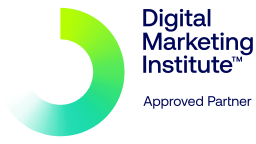Diploma in Digital Marketing Specialist Co-op
The Diploma in Digital Marketing Specialist Co-op program focuses on marketing, advertising and campaign management through the PPC marketing model, social media networks and research to build the correct marketing strategy. This program qualifies for Better Jobs Ontario funding.
This program is powered by the Digital Marketing Institute (DMI). Upon successful completion, you will also receive a Digital Marketing Associate certificate.

Fees & Facts
Learn from guest speakers and gain hands-on experience for in-demand transferable skills. Upon successful completion, you will be primed to acquire industry-recognized certifications.
Program Outcomes
- Develop digital advertising campaigns such as presentations, websites, social media, brochures, reports and newsletters
- Make use of tools such as WordPress, HTML and CSS, Google Adwords and Google Analytics
- Improve your writing and create content for promotional purposes
- Conduct surveys to identify the interests and concerns of key stakeholders
- Build, optimize and analyze PPC campaigns on Google Ads and Bing Ads
- Gain an additional certificate from the Digital Marketing Institute
- Strengthen your resume with Canadian work experience
- Co-op placement
Learning Partners

This program is powered by the Digital Marketing Institute (DMI) and upon successful completion, you will also receive a Digital Marketing Associate certificate. DMI is the global certification standard in digital marketing education. It works with global digital experts like Google, Facebook, Coca-Cola, Microsoft, IBM and LinkedIn to define the skills and qualifications required by today’s digital marketing professionals.
Co-op Experience
The co-op term provides you with an opportunity to integrate academic studies with related employment experience. We provide co-op* placement policy in the field of studies.
The co-op work experience could include positions in the following areas:
- Marketing
- Retail
- Not-for-profit
Common major activities may include, but are not limited to:
- Assisting in day-to-day marketing initiatives relevant to the host organization.
- Conducting research, assembling data, and reporting results.
The length of the placement will be 36 weeks (20 hours per week).
You will have at least 480 hours of guided learning hours, followed by 240 hours practicum hours in an established business.
The work placement will help you apply the theories you learn to practical business situations. We will help you secure your work placement by sending you for interviews.
The modules include:
1. Introduction to Marketing and Branding
This module is designed to provide you with the skills to build a customer profile and analyze the digital market. The module will enable you to understand the principles of digital advertising, the key elements of branding and competitive analysis.
2. Google SEO
In this module, you will learn about the internet and search engines. You will learn to review concepts and processes on the Internet, the meaning of a domain, how to purchase a domain and assess differences in URL extensions, storage servers and FTP files. This module will also focus on how search engines work and what factors influence website promotion (content, seniority, links, load times, Google spiders, negative SEO).
You will also learn about Online Reputation Management (ORM) and you’ll learn how to manage information presented on the internet (on the brand or product), while analyzing well-known cases on the subject.
Another concept covered during this module is market research and keywords. You will learn to identify trends and write customer reports about keyword research tools including keyword research practice and you’ll learn to manage the results.
Additionally, you will learn about optimization, including developing your familiarity with common errors and referrals, site accessibility to search engines and code testing, site structure testing tools and site content testing tools. You will practice site optimization testing and build a full optimization report.
3. Website Building and Design for Marketers
This module is designed to provide you with the skills needed to create a HTML page and manage content. The module will enable you to learn the principles of writing code, creating reflective and absolute links, integrating objects on a page and uploading the site to a network.
4. Google Analytics
Google Analytics is a software for analyzing web site traffic. You will practice using this, learn about account management and profiles, how to decode key reports and define goals. The final part of this unit includes preparation for the Google Analytics Certification exam.
5. Managing Social Media Sponsored Campaigns*
This module is designed to provide you with the skills to set up and manage campaigns using social media, analyze differences between campaigns types and build a visual strategy. The module will enable you to prepare for the Facebook Blueprint certification exam.
6. Pay Per Click Marketing with Google Ads*
In this module, you will learn to create a Google Ads account, rules for creating ads, using dynamic extensions, conversion types and using conversion optimizers. You will also learn about bidding including includes types of bidding strategies, advantages and disadvantages, strategy adjustments for business purposes and Return On Investment (ROI) tracking. The final part of this unit includes preparation for the Google Ads certification exams.
7. Campaign Management, Regulations and Compliance
This module is designed to provide you with basic skills in the following tools: LinkedIn, graphics software (for quick editing), social activity management and analysis software. You will also learn about regulatory and compliance practices that are being utilized within the digital marketing industry.
8. Copywriting
In this unit, you will get hands-on experience writing web content, including how to write a blog or a post, newsletters, emails, landing pages, display ads, Facebook ads, native ads and website content.
9. Work Placement
After you successfully complete the academic requirements of the module, you are required to complete 240 hours of program-relevant work placement. Business sectors you can take up a placement include marketing, retail, finance and accounting, not-for-profit, customer care and administration.
Although skills required for the job will vary depending on the placement, the key responsibilities include being supervised at all times, observing all workplace and school safety and security procedures, dressing appropriately, interacting professionally with staff, learning about the work environment, and participating in the daily routine as required by the employer.
A work placement has been incorporated into this diploma so you can put into practice the theoretical components of the program in practical learning situations and apply your skills to facilitate business operations. The Career Service Department will support you with securing a placement by sending you to interviews. Upon completion of your practicum, you are required to submit your placement report and an evaluation form will be completed by your supervisor in order for you to successfully graduate.
- Have an Ontario Secondary School Diploma or equivalent or be at least 18 years of age and pass the Wonderlic test.
For non-native English speakers:
- Successful completion of TSOM EAP Level 4 or
- Have the required IELTS 5.5 score or equivalent or
- Pass the TSOM English Assessment
Computer Use Expectation
In order to successfully progress through your studies at Toronto School of Management (TSOM), it is recommended that you have access to a personal computer or laptop. TSOM offers access to computer labs on campus, but availability cannot be guaranteed and some program software may not be available on all open access computers.
The assessment of each module consists of:
- 2 individual assignments or class tests: 25% each
- final exam: 40%
- contribution mark: 10%
If you do not pass the module, you can re-take the module when it is offered next and by paying a retake fee.
| Letter Grade | Percentage | Grade Point |
|---|---|---|
| A+ | 90 – 100 | 4.33 |
| A | 85 – 89 | 4.0 |
| A- | 80 – 84 | 3.67 |
| B+ | 77 – 79 | 3.33 |
| B | 73 – 76 | 3.0 |
| B- | 70 – 72 | 2.67 |
| C+ | 67 – 69 | 2.33 |
| C | 63 – 66 | 2.0 |
| C- | 60 – 62 | 1.67 |
| F | 0 – 59 | 0 |
Upon completion of this program, you will be awarded a Diploma in Digital Marketing Specialist Co-op.
Graduates of this certificate can expect career opportunities under NOC 1123 which includes positions such as:
- Advertising consultant
- Communication officer (except emergency services)
- Communications specialist
- Event marketing specialist
- Fundraising consultant
- Information officer
- Media co-ordinator
- Media relations officer
- Museum educator
- Press secretary
- Public affairs officer
- Public relations consultant
- Public relations officer
- Publicity agent
- Information consultant
- Information service co-ordinator







